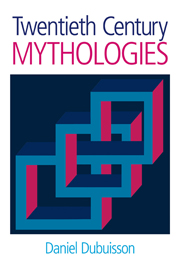Book contents
- Frontmatter
- Epigraph
- Contents
- Foreword by Professor Robert A. Segal
- Preface
- Abbreviations
- Introduction: History and comparative epistemology
- Part I Georges Dumézil, or Society
- Part II Claude Lévi-Strauss, or the Mind
- 7 The symbolic order
- 8 The Mythologiques: from overture to finale
- 9 From Marx to Kant
- 10 The semantics of myth
- 11 A Buddhist among the Bororo
- Part III Mircea Eliade, or the Sacred
- Conclusion: Modern theories of myth and the history of Western thought
- Bibliography
- Index
10 - The semantics of myth
from Part II - Claude Lévi-Strauss, or the Mind
- Frontmatter
- Epigraph
- Contents
- Foreword by Professor Robert A. Segal
- Preface
- Abbreviations
- Introduction: History and comparative epistemology
- Part I Georges Dumézil, or Society
- Part II Claude Lévi-Strauss, or the Mind
- 7 The symbolic order
- 8 The Mythologiques: from overture to finale
- 9 From Marx to Kant
- 10 The semantics of myth
- 11 A Buddhist among the Bororo
- Part III Mircea Eliade, or the Sacred
- Conclusion: Modern theories of myth and the history of Western thought
- Bibliography
- Index
Summary
Even in its trivial form, the question of an exclusive meaning, present in every statement, somewhat like the core of an apple, is no longer current for a rather simple reason, in which a sort of paradox is summarized, inherent in the question itself. Provided that it appears grammatically correct, one is tempted to recognize today that a statement carries with it not an exclusive and definitive meaning, but the possibility of evoking or giving birth to meanings that one can nuance or renew indefinitely. In addition, the universe of communication where these statements are engendered has its own rules – social, semiotic – of production and reception, different from one society to the next, which superimpose themselves on their properly linguistic characters. For all of these reasons, the possibility is henceforth excluded of attaining, of capturing in any statement a single meaning, stable, complete, and irrevocable. On the other hand, the Mythologiques having been finished before the double problematic of the communication and the reception presented itself, this problematic plays no role. It is, however, no longer possible to neglect it today, particularly as it contributed to the substitution of an immutable meaning for variable meanings.
As consolation for having lost a certain “absolute” idea of meaning, one can at least try to describe the particular mechanisms that engender these partial and provisional meanings.
- Type
- Chapter
- Information
- Twentieth Century Mythologies , pp. 153 - 160Publisher: Acumen PublishingPrint publication year: 2006

